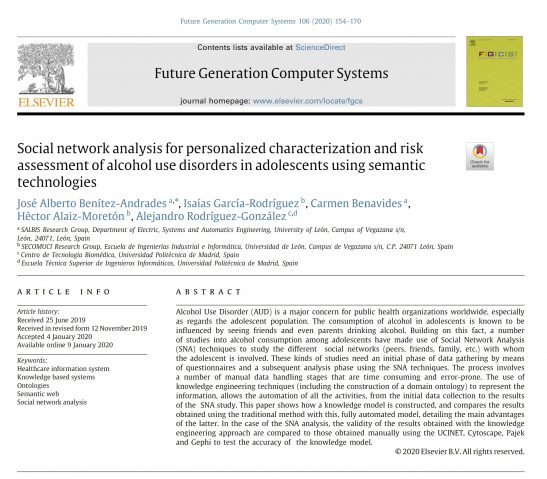Future Generation Computer Systems
Social network analysis for personalized characterization and risk assessment of alcohol use disorders in adolescents using semantic technologies
Highlights
- • Social Network Analysis (SNA) studies are time-consuming and potentially error-prone.
- • The use of semantic technologies eases the development of complex SNA studies.
- • A knowledge model (a domain ontology) for SNA has been developed and validated.
- • A software tool using the ontology shows the advantages of the approach.
- • Results are presented, comparing them to the traditional approaches.
Abstract
Alcohol Use Disorder (AUD) is a major concern for public health organizations worldwide, especially as regards the adolescent population. The consumption of alcohol in adolescents is known to be influenced by seeing friends and even parents drinking alcohol. Building on this fact, a number of studies into alcohol consumption among adolescents have made use of Social Network Analysis (SNA) techniques to study the different social networks (peers, friends, family, etc.) with whom the adolescent is involved. These kinds of studies need an initial phase of data gathering by means of questionnaires and a subsequent analysis phase using the SNA techniques. The process involves a number of manual data handling stages that are time consuming and error-prone. The use of knowledge engineering techniques (including the construction of a domain ontology) to represent the information, allows the automation of all the activities, from the initial data collection to the results of the SNA study. This paper shows how a knowledge model is constructed, and compares the results obtained using the traditional method with this, fully automated model, detailing the main advantages of the latter. In the case of the SNA analysis, the validity of the results obtained with the knowledge engineering approach are compared to those obtained manually using the UCINET, Cytoscape, Pajek and Gephi to test the accuracy of the knowledge model.

